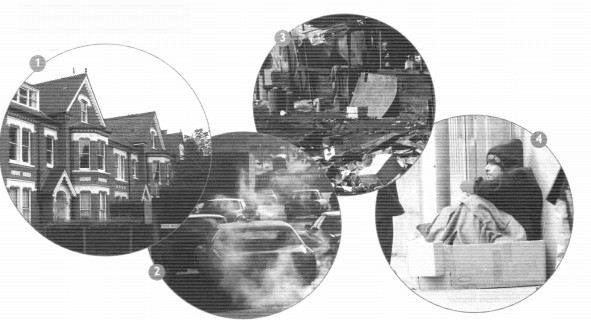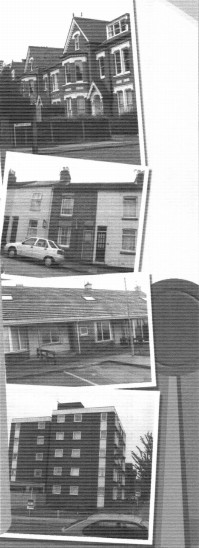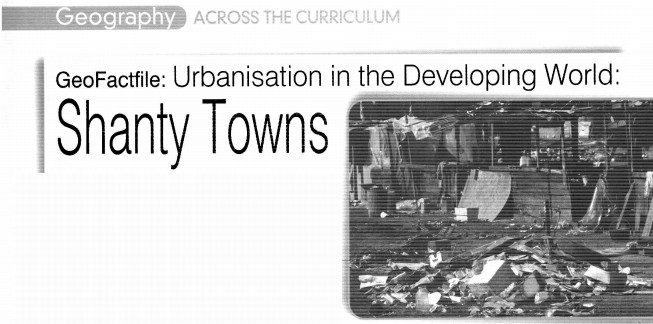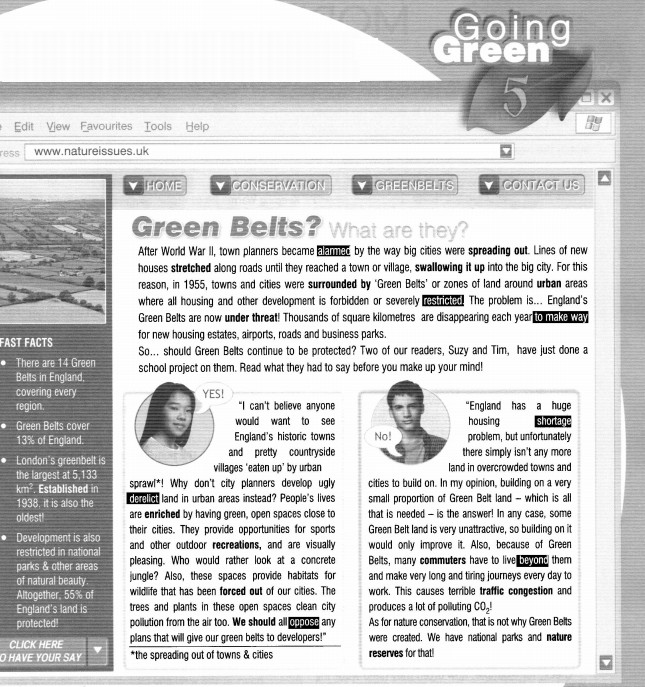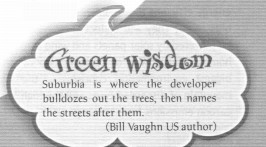Гипермаркет знаний>>Английский язык>>Английский язык 11 класс>> Module 5 Who are you
Who are you?
Before you start…
• When was the last time you got ill?
• Have you ever had an accident? What happened?
Look at Module 5
Find the page numbers for pictures 1 -4.
Find the page numbers for
• a report
• a quotation
• a cartoon
Listen, read and talk about ……..
• homelessness
• types of houses
• problems in a neighbourhood
• Feng Shui
• Tess of the d’Urbervilles by Thomas Hardy
• houses in Britain
• shanty towns
• green belts
• a neighbour’s complaint
Learn how to …
• express annoyance
• agree/disagree
• make exclamations
• make assumptions
Practise …
• modals (probability, possibility, ability, necessity/obligation, lack of necessity, advice)
• phrasal verbs: do
• prepositional phrases related to home repairs
• idioms related to parts of houses
• formal style
• linking words and phrases
Write / Make / Have …
• a report making suggestions/ recommendations
• a short article about homes in your country
• a proposal for the city council
• a class debate about Green Belts
Imagine living in a sweet little country house called ‘Rose Cottage’ or a huge Tudor1-style house called ‘Woodlands’. Sounds nice, doesn’t it? Not all British
people are 1)……(luck) enough to live in houses as nice as these, but they do live in a wide range of houses that can be newly-built or up to 500 years old.
Detached & Semi-detached Houses
A lot of British people live in detached or semidetached properties. A detached house is not joined to another. A semi-detached is joined on one side to another house. They are brick houses built in 2)……. (vary) styles. They are made of either red or brown brick. Some of the houses 3)……. (build) in Victorian times between 1837 and 1901 were large villas. The exteriors are like works of art with steep slate roofs, stained glass panels in doors and windows, iron railings, tall chimney pots and large bay windows2. They also had basements and attics. This type of house is often found in the suburbs, on the outskirts of a town or city or in villages.
Terraced Houses
Most people who live in or near town centres live in terraced houses. Most terraced houses were built to house people who came to towns and cities to work in the factories and mills during the 4)……..(Industry) Revolution3. Rows of houses were built back-to-back and they were joined together to save space. Each row of houses is a terrace and they only have two rooms downstairs and two rooms upstairs.
Flats & Council Houses
In inner-city areas, you can often find huge tower blocks of flats most of which were built during the 1950s and 60s. Some of these have been renovated and have 5)……..(recent) become popular with wealthy young 6)………(profession). Others are council-owned or cheap-to-rent flats that were built after the Second World War to replace houses that had been destroyed or to clear urban slums4. Also, in many cities and towns there are large council house estates.
Bungalows
A bungalow is a house which is only on one floor with no stairs. It may be joined to another bungalow or it might stand alone. Some of them have an extra room in the loft5. These are called dormer bungalows. They are 7) …………(usual) found in the suburbs or in villages. 8)………(retire) or elderly people often live in these houses.
1 15th century,2 window that sticks out from the outside wall, 3 time of rapid manufacturing growth in the mid 18th century, 4 areas where living conditions are very bad, 5 the space between the ceiling and the roof
1 What do you know about British houses? What else would you like to know? Write three questions. Read the texts and see if you can answer your questions.
2 a RNE Read again and fill in the gaps (1-8) with the correct words derived from the words in brackets.
b G Listen and read the text again. Explain the words in bold.
3 Imagine you have just returned from a trip to Great Britain. Use the information in the text to give a two-minute talk about British houses. Talk about
:
types location characteristics cost
4 Portfolio: A British school magazine has asked for some information about homes in your country. Write a short article. Include: types, sizes, where they are (e.g. in the suburbs), who lives in them and what features they have.
What exactly is a shanty town?
A shanty town (or slum) is an overcrowded community of rough huts or poor quality houses which have 1)…….. or no access to basic services like clean water and electricity. Shanty towns are usually located on the outskirts of pities,- or on dangerous or worthless land that no one else wants. Since shanty towns are illegal, governments don’t have to provide the people who live in them with medical care, education, or other basic services and rights.
Why do they develop?
Every day, approximately 180,000 people around the world move from the countryside into cities. Some move to escape poverty or conflict, others are simply attracted by the prospect of a better life. Unfortunately, in many parts of the developing world, governments have not 2)……plans GeoFactfiie: Urbanisation in the Developing World to cope with the vast numbers of people arriving in their cities each year. In particular, they have failed to provide decent and affordable housing. As a result, many end 3)………living in terrible conditions: shanty towns.
What is life like in a shanty town?
Unemployment and poverty levels are high in shanty towns. Malnutrition and child labour are common. Since shanty towns are overcrowded and usually without rubbish collections, clean water or sanitation facilities (in the Kibera slum in Nairobi, for example, 40,000 people share just 10 toilets), they are polluted, filthy environments where disease 4)……..quickly. Also, the high level of poverty often leads to organised crime and violence. However, these communities are full of life and residents have a 5)……community spirit.
Is anything being done?
International agencies are working with governments of developing countries, and also residents themselves, to improve the situation. For example, charities sometimes offer residents loans so that they can set up businesses and 6)………a decent living. In Rio de Janeiro, Brazil, the authorities have now officially accepted their country’s shanty towns as permanent and are providing them with electricity, water and other amenities. But slum dwellers aren’t just waiting for others to solve their problems! In Thailand, slum communities have worked together to resolve arguments over land and in some 7)…… have gained legal ownership.
1 Look at the picture. What is a shanty town? How can these words be related to it?
• overcrowded community • basic services
• illegal • medical care • unemployment
• poverty • malnutrition • child labour
• clean water • disease • crime
• legal ownership
Read and check.
2 a RNE Read again and choose the correct word (A, B, C or D) for each gap (1-7).
1 A few B little C small D less
2 A done B put C made D had
3 A up B by C with D away
4 A flows B covers C spreads D catches
5 A high B deep C heavy D strong
6 A win B gain C earn D have
7 A cases B matters C incidents D examples
b Explain the words/phrases in bold.
3 Listen and read the text again. Answer the questions.
• How were shanty towns started?
• What main problems do people living in shanty towns face?
• What can be done to improve the situation?
4 THINK! Work in groups. Imagine you live in a shanty town. Prepare a proposal for the city council to improve conditions in the shanty town. Think about:
• housing • sanitation • services
1 Look at the picture on the web page. What could a Green Belt be?
Listen to and read the web page to check.
2 Who (Suzy, Tim or both) mention(s): that the country needs more of something? the relationship between Green Belts and conservation? that some areas of Green Belts are ugly? the effect that Green Belts have on pollution levels? Who do you agree with the most? Why?
3 Match the highlighted words with their meanings: on the other side of, disagree with/fight against, unused & in a bad state, limited, to create space, inadequate amount, afraid/anxious. Then explain the words/phrases in bold.
4 THINK! Work in two groups: those for Green Belts and those against. Use the text to help you prepare a class debate.
Match the headings (A-H) to the paragraphs (1-7). There is one heading that you do not need to use.
1 Smoke detectors in homes have saved countless lives. They sense the presence of smoke in the house and alert the occupants by making a loud beeping noise, giving them time to escape. In order to be kept in good working condition, they should be tested at least once a month and cleaned once a year.
2 One of the attractions of living in the country is a blazing log fire. However, open fires are one of the most inefficient forms of heating, since most of the heat disappears up the chimney. They also produce lots of smoke which, of course, pollutes the environment. From both a financial and environmental point of view, it is better to use other methods of heating.
3 Most people strive to buy a house with a garden but what happens if the budget just doesn’t allow it? Well, those of you who live in an apartment can bring a bit of nature inside by placing some houseplants around your living space. All they need is a little care and attention! Be sure to check, for example, how often they need watering and what kind of conditions they prefer, such as bright or shady, warm or cool.
4 Plans were announced today to build sixteen new homes in Brighton using fifteen thousand old car tyres. The developers claim that they will be so energy efficient that residents will have no utility bills at all! They will collect their own water and be powered by solar panels and wind turbines. The homes offer a way of tackling two of Britain’s biggest environmental concerns — the growing mountain of discarded tyres and the high levels of carbon emissions from housing.
5 ln a few years we might be living in ‘smart’ houses. A smart house is a house where the appliances have a computer fitted inside them, so that they can ‘communicate’ with each other. For example, groceries are ordered when your fridge sees that you are running low on essentials and when you enter your home, temperature, lighting and music are activated according to your personal preferences.
6 Accidents in the home account for about forty per cent of all accidents and a third of all accidents treated at hospital. The most dangerous area of the home is the living room, followed by the garden, kitchen, stairs, bedroom and bathroom. The main factor is age, with young children having the greatest number of accidents. Falls are by far the greatest cause of fatal home accidents, causing more than two thousand deaths in Britain each year.
7 There’s nothing more discouraging than spending hours at the weekend cleaning and organising your home, only to find it in a total mess again by Wednesday! So, why not set aside fifteen minutes per day for maintaining your living space in order to minimise clutter as the week goes on? Good ideas include assigning one small, quick job to each member of the household each day, and putting something back where it belongs every time you leave a room.
Listen to the radio programme. For each question (1-7), choose A, B or C.
1 The man says he decided to go to Africa because
A he wanted to do something different with his life.
B his daughter persuaded him to do it.
C it was something he had always wanted to do.
2 The man says that his boss
A offered him more money to stay.
B understood his reasons for going.
C was concerned about filling his position.
3 The event that stands out in the man’s memory is
A seeing the house he was to stay in.
B meeting the villagers for the first time.
C the view as he entered the village.
4 The thing that most surprised the man about his new home was that
A it was so basic.
B it was nicer than he had expected.
C it was considered to be nicer than the other houses in the village.
5 They had to cook before the sun set because
A they could only get cooking water during the day.
B they had no electric lights.
C the fire had to be put out after dark.
6 The man slept so well in Uganda because
A it was so quiet there.
B his bed was comfortable.
C he felt so safe and secure.
7 In the future, the man plans to
A continue living in England.
B go back to Africa.
C try living somewhere else.
Complete the gaps (1-6) with the correct derivatives of the words in bold.
A yurt is the 1)………..home of nomadic people from Mongolia, Siberia, China and Central Asia. The word ‘yurt’ or ‘yurta’ 2)…………. comes from the Turkish word meaning ‘dwelling place.’ It is 3) ……… in shape and is easy to assemble, take down and transport. Made of a 4)………..frame and covered with felt, it is a popular place to live in the summer months. You will sometimes find it used in other countries too, as it is an 5)…………form of temporary housing. In Europe, 6)…………..on Mongolian and Central Asian-styled yurts are made using other materials, such as local hardwoods. Yurts are used for all sorts of different purposes, from permanent housing to school rooms.
TRADITION ORIGIN CIRCLE WOOD EXPENSIVE VARY
Read the extract from your friend Amy’s email. Write an email to Amy. In your email:
• tell her about your new home
• ask three questions about gardening
Write 100-140 words.
I can’t believe you’ve moved away! What’s your new home like? Do you like it better than your old one? I’m so happy summer’s here at last. I’ve been helping my dad out in the garden lately!
Give a two-minute talk about your area. Remember to:
• say what your area is called & where it is
• say how long you have lived there
• describe your area
• say which things you like/don’t like about your area and why
Progress Check
1 Fill in: rough, run-down, warehouses, market, I capital, roof, drain, full, stained, slate.
1 The door had a beautiful…………glass panel in it.
2 Many people would be happy just to have a………..over their heads.
3 An urban redevelopment scheme can turn disused ……….. into luxury flats.
4 We turned the corner and the house came into …………..view.
5 The council have fixed up a lot of…………..buildings in my town lately.
6 The house had a steep ………… roof.
7 I come from a small ……………. town in the north of England.
8 Don’t just throw your money down the ……….
9 Unfortunately, lots of people sleep……………in many cities.
10 Do you know what the…………..city of Croatia is?
2 Fill in: must, mustn’t, can’t, don’t have to, should, might, would, shall, will, can. In some case more than one answer is correct.
1 ……….. you hold the door open for me, please?
2 You…………use public transport when you have a car.
3 You……..drive through a red traffic light.
4 Tom………..move to the country soon because he hates living in the city.
5 The new bypass ……….. reduce traffic congestion in the town centre.
6 Drivers ………… stop at a ‘stop’ sign.
7 Cyclists …………. wear reflective clothing at night.
8 Most people ……………… afford a house without a mortgage in the UK.
9 …………..we visit Jane in her new flat tonight?
10 You …………. park on a single yellow line for one hour onty in the UK.
3 Complete the sentences using the words in bold. Use two to five words.
1 She has probably settled into her new home by now.
should She ……… new home by now.
2 There was no reason to worry about finding a parking space; it was easy.
need I…….. finding a parking space; it was easy.
3 It’s not a good idea to go out alone at night.
go You…………..alone at night.
4 It’s against the law for drivers to park on double yellow lines in Britain.
not You…………double yellow lines in Britain.
5 It’s possible that Pam will come to the party,
come Pam……………the party.
4 Complete the phrasal verbs with the correct particle.
1 I could do………..taking the bus to work every day; it’s a nuisance.
2 Do…………..your laces or you’ll trip over them.
3 Moving house completely did me…………..
4 We don’t have much money, so we have to do……………a lot of things.
5 My dad buys houses, does them …………… and sells them for a profit.
5 Fill in the gaps with the correct preposition.
1 I am really………..need of a new car.
2 I’m afraid this old fridge is…………repair.
3 My house is within easy reach …………..the town centre.
4 The house is cheap because it is …………..bad condition.
5 I need to call a plumber to look………..this pipe.
6 Match to form exchanges
1 Oi!
2 It drives me crazy.
3 Yuk!
4 It doesn’t really bother me.
5 Phew!
a Yes, it is really annoying!
b It makes me angry.
c What a relief!
d top that!
e That’s revolting!
Now I Can …..
• talk about homelessness
• talk and write about houses
• express annoyance
• make exclamations
• use modals
• use formal style in reports
• write a report making suggestions
• write a proposal to improve a shanty town
• have a class debate about Green Belts
Английский язык. 11 класс : учеб. для общеобразоват. учреждений / [О.В. Афанасьева, Дж.Дули, И.В. Михеева и др.]. — 2-е изд., доп. и перераб. — М.: Express Publishing : Просвещение, 2009. — 244 с. : ил. — (Английский в фокусе).
Английский язык скачать, задача школьнику 11 класса, материалы по английскому языку для 11 класса онлайн
Содержание урокаконспект урока
опорный каркас
презентация урока
акселеративные методы
интерактивные технологии Практика
задачи и упражнения
самопроверка
практикумы, тренинги, кейсы, квесты
домашние задания
дискуссионные вопросы
риторические вопросы от учеников Иллюстрации
аудио-, видеоклипы и мультимедиа
фотографии, картинки
графики, таблицы, схемы
юмор, анекдоты, приколы, комиксы
притчи, поговорки, кроссворды, цитаты Дополнения
рефераты
статьи
фишки для любознательных
шпаргалки
учебники основные и дополнительные
словарь терминов
прочие Совершенствование учебников и уроков
исправление ошибок в учебнике
обновление фрагмента в учебнике
элементы новаторства на уроке
замена устаревших знаний новыми Только для учителей
идеальные уроки
календарный план на год
методические рекомендации
программы
обсуждения Интегрированные уроки
Если у вас есть исправления или предложения к данному уроку, напишите нам.
Если вы хотите увидеть другие корректировки и пожелания к урокам, смотрите здесь — Образовательный форум.
Авторські права | Privacy Policy |FAQ | Партнери | Контакти | Кейс-уроки
© Автор системы образования 7W и Гипермаркета Знаний — Владимир Спиваковский
При использовании материалов ресурса
ссылка на edufuture.biz обязательна (для интернет ресурсов —
гиперссылка).
edufuture.biz 2008-© Все права защищены.
Сайт edufuture.biz является порталом, в котором не предусмотрены темы политики, наркомании, алкоголизма, курения и других «взрослых» тем.
Разработка — Гипермаркет знаний 2008-
Ждем Ваши замечания и предложения на email: 
По вопросам рекламы и спонсорства пишите на email: 
Read again and choose the correct word (А, В, С or D) for each gap. What is the author’s purpose?
А. Первым делом, ВСЕГДА доверяйте своей интуиции! Скажем, вы гуляете с вашей собакой 1) по пустынной дороге вечером, и вдруг такое ощущение, что за вами следят. Это возможно ваша интуиция (intuition) 2) говорит вам, что было бы неплохо попасть 3) на людную дорогу, как можно быстрее. Кроме того, если вы действительно оказываетесь в угрожающей (threatening) ситуации, не делайте ничего, что может 4) сделать ситуацию еще хуже. Если грабитель (mugger) пытается вырвать сумку на улице, например, дайте ему ее немедленно, без ввода в бой (putting up a fight). Если вы попытаетесь бороться или бежать, злоумышленник может проявить жестокость, и вы можете в конечном итоге 5) получить травму. Таким же 6) образом, если незнакомый человек на улице, или даже кто-то из ваших знакомых говорит что-то обидное (insulting) для вас, не отвечайте грубостью. Просто уйдите спокойно, не вдаваясь в бой. В принципе, не рискуйте!
B. Избегайте возможных атак заранее, используя здравый смысл (common sense)! Это означает всегда ходить в хорошо освещенных, оживленных 7) местах, не используя коротких путей (short cuts) по одинокой улице, убедившись, что друзья и семья знают, где вы находитесь, и когда вы вернетесь, а мобильный телефон с вами. Кроме того, не забывайте ходить быстро и уверенно, потому что злоумышленники обычно 
С. Если на вас когда-нибудь нападут, не думаю, что вы сможете просто отразить (beat) атакующий удар как эксперт каратэ, подобно тем, которых вы видели в кино, тыкайте (poke) ему в глаза ключи и бегом 9) оттуда! Злоумышленник, как правило, будет готов ко всему, потому что они ожидают, что вы можете сделать. Единственный совет, пройти уроки самообороны. Хороший инструктор по самообороне научит вас специальным методам, например, как удивить злоумышленника. У вас также будет время попрактиковать свои навыки, чтобы не паниковать 10) во время нападения — вы будете точно знать, что делать! Таким образом, обратитесь в полицейский участок или в местный общественный центр, чтобы узнать, где можно взять пару уроков.
3 Прочитайте еще раз и выберите правильное слово (A-D) для каждого промежутка (1-10). Прочитайте и проверьте.
Зов Антарктиды. Последняя Великая Пустыня на Земле
Сто лет назад великие исследователи Скотт, Шеклтон и Амундсен первыми достигли Южного полюса. Сегодня перед прекрасным замороженным континентом Антарктида стоит несколько очень разных проблем…
Глобальное потепление
Глобальное потепление не является чем-то новым. Мы все знаем, что сжигание ископаемого топлива, выбросов парниковых газов и обезлесение (deforestation) 1) вызывают повышение температуры в мире. Но 2) за последние 50 лет температура Антарктиды увеличилась примерно на 3 градуса, примерно в 10 раз больше, чем в остальных частях мира! В результате, ледники и морские льды тают, а шельфовые ледники срываются в море, что является очень плохой новостью! Если Антарктический плотный полярный (polar) ледниковый покров, 3) действительно, растает, то ожидается не только нагрев по всему миру, но и на глобальном уровне море может подняться на 6 метров, затопив (flooding) многие прибрежные районы. Это очень беспокоит, так как почти все города с более чем 10 миллионов человек 4) находятся на побережье!
Еще одной проблемой является то, что таяние льдов формирует облака, которые 5) приводят к сильным снегопадам. Это может сделать жизнь очень трудной для некоторых диких животных в Антарктике, например, пингвинов, чьи яйца могут испортиться в глубоком снегу. Ученые также беспокоятся о повышении температуры моря. Море сейчас всего на 2 градуса теплее, а моллюски не могут погружаться (bury) на морское дно, Моллюски-колпачки не могут перевернуться, а Скалопы (один из видов двустворчатых моллюсков) не могут плавать. Этих существ хищникам (predators) теперь поймать легче, 6) а именно от них зависит вся пищевая цепь. Это не будет долго продолжаться, пока всё больше птиц и животных, таких как киты, тюлени и морских львов находятся под угрозой исчезновения, если температура моря продолжит расти!
Влияние человека
Антарктида называется «Последней Великой Пустыней (wilderness) на Земле» не без 7) причин! Ни одна страна ей не владеет, и там не живут никакие коренные жители. Таким образом, чистый воздух, вода и лед делает его идеальным местом для ученых 
1 B
2 D
3 A
4 B
5 B
6 A
7 D
8 A
9 C
10 D
Read again and choose the correct word (А, В, С or D) for each gap. What is the authors purpose?
А. Первым делом, ВСЕГДА доверяйте собственной интуиции! Скажем, вы гуляете с вашей собакой 1) по пустынной дороге вечером, и вдруг такое чувство, что за вами смотрят. Это возможно ваша интуиция (intuition) 2) говорит для вас, что было бы неплохо попасть 3) на многолюдную дорогу, как можно прытче. Не считая того, если вы действительно оказываетесь в грозящей (threatening) ситуации, не делайте ничего, что может 4) сделать ситуацию еще хуже. Если грабитель (mugger) пробует вырвать сумку на улице, например, дайте ему ее немедленно, без ввода в бой (putting up a fight). Если вы попытаетесь сражаться либо бегать, злоумышленник может проявить жестокость, и вы сможете в окончательном итоге 5) получить травму. Таким же 6) образом, если неизвестный человек на улице, либо даже кто-то из ваших знакомых разговаривает что-то обидное (insulting) для вас, не отвечайте грубостью. Просто уйдите спокойно, не вдаваясь в бой. В принципе, не рискуйте!
B. Опасайтесь вероятных атак заблаговременно, используя здоровый смысл (common sense)! Это значит всегда ходить в хорошо освещенных, оживленных 7) местах, не используя коротких путей (short cuts) по одинокой улице, убедившись, что друзья и семья знают, где вы находитесь, и когда вы вернетесь, а мобильный телефон с вами. Кроме того, не запамятовывайте ходить скоро и уверенно, поэтому что злоумышленники обычно 
С. Если на вас когда-нибудь нападут, не думаю, что вы можете просто отразить (beat) нападающий удар как эксперт каратэ, сходственно тем, которых вы лицезрели в кино, тыкайте (poke) ему в глаза ключи и бегом 9) оттуда! Злоумышленник, как верховодило, будет готов ко всему, поэтому что они ждут, что вы можете сделать. Единственный совет, пройти уроки самообороны. Хороший инструктор по самообороне обучит вас особым способам, к примеру, как изумить злодея. У вас также будет время попрактиковать свои способности, чтоб не паниковать 10) во время нападения — вы будете точно знать, что делать! Таким образом, обратитесь в полицейский участок либо в местный публичный центр, чтоб выяснить, где можно взять пару уроков.
Задать свой вопрос

Choose the correct answer: few or little. (Выбери правильный вариант: few или little.)
1. Mistakes —
few
little
2. words —
few
little
3. luck —
few
little
4. space —
few
little
Остались вопросы?
Новые вопросы по предмету Английский язык


